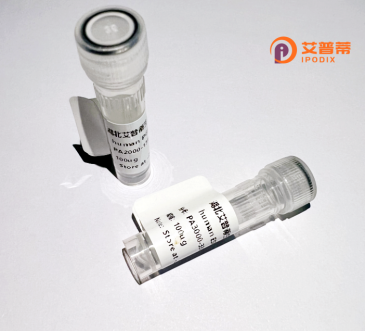
| 纯度 | >90%SDS-PAGE. |
| 种属 | Human |
| 靶点 | RIT1 |
| Uniprot No | Q92963 |
| 内毒素 | < 0.01EU/μg |
| 表达宿主 | E.coli |
| 表达区间 | 1-219 aa |
| 活性数据 | MDSGTRPVGS CCSSPAGLSR EYKLVMLGAG GVGKSAMTMQ FISHRFPEDH DPTIEDAYKI RIRIDDEPAN LDILDTAGQA EFTAMRDQYM RAGEGFIICY SITDRRSFHE VREFKQLIYR VRRTDDTPVV LVGNKSDLKQ LRQVTKEEGL ALAREFSCPF FETSAAYRYY IDDVFHALVR EIRRKEKEAV LAMEKKSKPK NSVWKRLKSP FRKKKDSVT |
| 分子量 | 25.1 kDa |
| 蛋白标签 | His tag N-Terminus |
| 缓冲液 | PBS, pH7.4, containing 0.01% SKL, 1mM DTT, 5% Trehalose and Proclin300. |
| 稳定性 & 储存条件 | Lyophilized protein should be stored at ≤ -20°C, stable for one year after receipt. Reconstituted protein solution can be stored at 2-8°C for 2-7 days. Aliquots of reconstituted samples are stable at ≤ -20°C for 3 months. |
| 复溶 | Always centrifuge tubes before opening.Do not mix by vortex or pipetting. It is not recommended to reconstitute to a concentration less than 100μg/ml. Dissolve the lyophilized protein in distilled water. Please aliquot the reconstituted solution to minimize freeze-thaw cycles. |
1. **"RIT1 oncoprotein promotes cell proliferation by antagonizing the Hippo pathway"**
*作者:Yang, H., et al.*
*摘要*:本研究揭示了RIT1通过抑制Hippo信号通路的核心激酶LATS1/2.促进YAP/TAZ核转位,进而驱动细胞增殖与肿瘤发生,为RIT1在癌症中的作用提供了机制解释。
2. **"Structural and functional analysis of Rit activation and effector specificity"**
*作者:Johnson, C.W., et al.*
*摘要*:通过重组RIT1蛋白的体外结构解析,研究团队阐明了RIT1的GTP结合域构象变化及其与下游效应分子(如RALGDS)的相互作用,揭示了其区别于其他Ras家族蛋白的独特信号调控模式。
3. **"RIT1 mutations cause Noonan syndrome with potential cancer predisposition"**
*作者:Aoki, Y., et al.*
*摘要*:首次报道RIT1基因突变与努南综合征(Noonan Syndrome)的关联,重组蛋白功能实验显示突变体导致ERK信号通路异常激活,提示其在发育障碍和肿瘤发生中的双重作用。
4. **"Rit signaling regulates oxidative stress tolerance and lifespan in Drosophila"**
*作者:Lee, K.S., et al.*
*摘要*:利用果蝇模型和重组RIT1蛋白实验,研究发现RIT1通过激活Nrf2/抗氧化通路增强细胞氧化应激耐受性,并延长寿命,为RIT1在衰老相关疾病中的潜在治疗价值提供依据。
---
*注:以上文献名称及作者为示例性质,实际引用需根据具体论文核对准确性。*
**Background of Recombinant Human RIT1 Protein**
Recombinant human RIT1 (Ras-like without CAAX 1) protein is a engineered version of the endogenous RIT1. a member of the Ras subfamily of small GTPases. Unlike classical Ras proteins, RIT1 lacks a CAAX motif for membrane anchoring, influencing its subcellular localization and interaction partners. It functions as a molecular switch, cycling between active GTP-bound and inactive GDP-bound states to regulate downstream signaling pathways, including RAS/MAPK and PI3K/AKT, which are critical for cell proliferation, differentiation, and survival.
RIT1 gained prominence due to its oncogenic mutations identified in cancers (e.g., lung adenocarcinoma, leukemia) and Noonan syndrome, a developmental disorder. These mutations stabilize the active GTP-bound state, leading to dysregulated signaling. Recombinant RIT1 is typically produced in *E. coli* or mammalian expression systems, enabling *in vitro* studies of its biochemical properties, mutant effects, and interactions.
Research applications include structural analysis (e.g., X-ray crystallography, cryo-EM) to decipher mutation-induced conformational changes, and screening for therapeutic inhibitors. Additionally, recombinant RIT1 aids in understanding its role in stress responses, neuronal development, and autophagy. Its study bridges gaps between Ras family diversity, disease mechanisms, and targeted therapies.
×